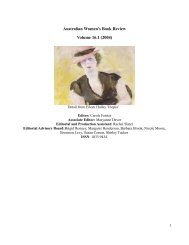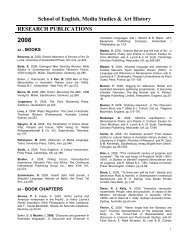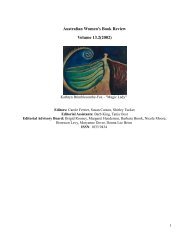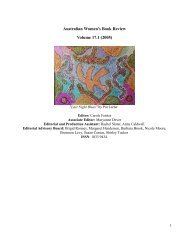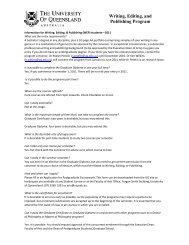Australian Women's Book Review Volume 14.1 - School of English ...
Australian Women's Book Review Volume 14.1 - School of English ...
Australian Women's Book Review Volume 14.1 - School of English ...
You also want an ePaper? Increase the reach of your titles
YUMPU automatically turns print PDFs into web optimized ePapers that Google loves.
him - for having been educated in Britain. Oddly, the independence so proudly expressed in one<br />
paragraph is almost immediately dissipated as the British are now portrayed as the heroes - the nation<br />
that 'educated' the father and that the Taliban resents and punishes. Do the Afghans benefit from<br />
Independence then, or not? This book would suggest that they are much worse <strong>of</strong>f without the 'help'<br />
they receive.<br />
Parvana's father (and then Parvana herself) reads letters for people in the market. So his symbolic link<br />
with the outside (Western) world is well established, and again proves his value. We can once more be<br />
safely outraged at his treatment, since he is more like us than not. He fits into a long tradition <strong>of</strong> poor<br />
but noble peasants. He is worthy as a role model Afghan, because he is educated and has been, it may<br />
be implied, (almost) as badly treated as Americans on the date.<br />
Parvana and her siblings are also substitute Westerners. She is <strong>of</strong>ten confused by what she sees around<br />
her (women in burqas), totally befuddled by the politics <strong>of</strong> the war, naïve about the circumstances in<br />
her own country. The only reason she knows about land mines is because someone from the United<br />
Nations once came into her class to talk about them (167). Even her father seems totally bemused by<br />
Afghani politics ' I don't know why they arrested me. How would I know why they let me go?' (162).<br />
And commerce is the perceived desire. Parvana and the other girl, whom she discovers is also dressing<br />
up as a boy to provide for her family, are singularly interested in finding ways to make more money.<br />
Oddly, they speak remarkably like Americans, and the dialogue has them saying things like; ' Hey,<br />
maybe if we can work together, we can come up with a better way to make money!' (100).<br />
In addition, there is not one Afghan in this book who doesn't wish to move away, to a Western country.<br />
The glimmer <strong>of</strong> hope for the girls is that one day they'll meet at the Eiffel Tower (167). (let's hope none<br />
<strong>of</strong> them aspire to Australia, given the tiny percentage <strong>of</strong> those currently on Nauru assessed as 'genuine'<br />
refugees!). No suggestion is made that life as immigrants might be just as, if not more, difficult than the<br />
life they are leading. It's the American dream, imposed seamlessly. It's hard not to wonder, too, in what<br />
ways this feeds into currently hyperbolised fears <strong>of</strong> immigration and the so-called 'refugee crisis'. What<br />
if everyone in the world really does want to come to the West? Then what?<br />
There is also an interesting politics <strong>of</strong> envy exemplified in the book … above all, Parvana says, she just<br />
wants 'a normal, boring life'(139). It's not hard to interpret this as meaning she wants the normal, boring<br />
White Western life that the readers (they should remember) are lucky enough to be leading. We can<br />
walk away from this book with a great sense <strong>of</strong> superiority.<br />
Strangely, a judgmental, almost sneering tone creeps in at various stages in the book. The authorial<br />
ideology seems implacably one <strong>of</strong> Afghanis as essentially barbaric, certainly illogical. The father<br />
explains history in the region in this way: 'After the Soviets left, the people who had been shooting at<br />
the Soviets decided they wanted to keep shooting at something, so they shot at each other' (16).<br />
Similarly, and amazingly, later in the novel someone suggests, about Kabul, 'maybe someone should<br />
drop a big bomb on the country and start again' (140).<br />
The author also cannot stop herself from imposing her own position on her Afghani characters. Her<br />
outsider point <strong>of</strong> view, her judgment <strong>of</strong> Islamic women, is evident. When Parvana asks her father how<br />
women in burqas manage to see where they're going, her father tells her 'they fall down a lot'. Similarly,<br />
at another point in the novel, Parvana wonders how women in burqas recognize each other at all. These<br />
47



